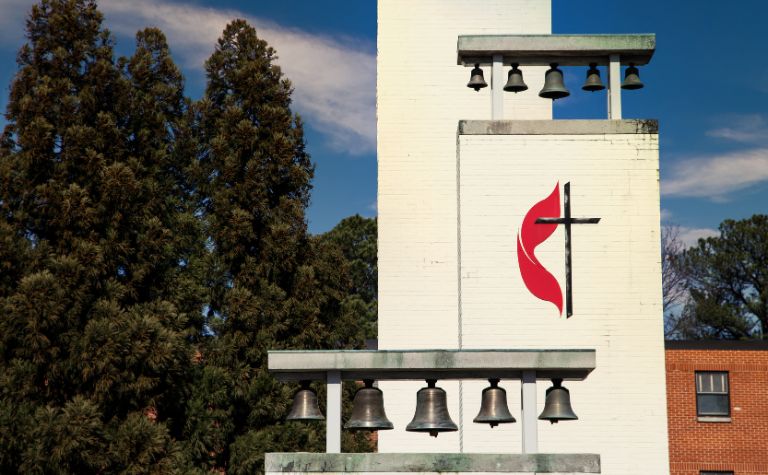The Methodist branch of Protestant Christianity is known, in part, for its focus on discipleship. Advocates of the Pentecostal and charismatic movement state that, among other things, speaking in tongues helps Christians grow as disciples. So do Methodists speak in tongues?
In general, Methodist denominations are open to their pastors and church members speaking in tongues, and some do, but it’s not a focus of the tradition’s doctrine or practices. The largest Methodist denomination offers guidelines and best practices regarding speaking in tongues.
What is a “cessationist” Methodist? What is a “continuationist” Methodist? Do Methodists believe in the baptism of the Holy Spirit? What did the founder of Methodism, John Wesley (1703-1791), think about speaking in tongues? Keep reading to learn more.
See Do Lutherans Speak in Tongues? to learn more.

Are Methodists Cessastionists or Continuationists?
In Christian theology, a cessationist (from the word “cease) is someone who believes that while many spiritual gifts described in the New Testament are available for believers today, the so-called “miraculous gifts” like speaking in tongues aren’t. Continutationists (from the word “continue”) believe they are.
- Cessationists, whether Methodist or a member of another tradition, believe that God gave the miraculous gifts for establishing the church in the first century. Still, they are no longer operational today.
- Continuationists don’t believe that the miraculous gifts were just for the century but are available to Christians in every era. In the 20th century, the church recovered the gifts because of God’s grace.
| Cessationism | Continuationism |
|---|---|
| Definition: certain miraculous spiritual gifts, like speaking in tongues, were only for the early church in the first century | Definition: all spiritual gifts, miraculous or otherwise, are available to believers in every century |
| Purpose: the purpose of miraculous gifts was to confirm the proclamation of the Gospels to establish the Church | Purpose: the purpose of miraculous gifts is to empower the church for effective ministry in all eras |
| Methodism: the largest Methodist denominations welcome and support cessationists and encourage them to be in harmonious relationships with continuationists | Methodism: the largest Methodist denominations welcome and support continuationists and encourage them to be in harmonious relationships with cessationists |
Something many people wonder about Christianity is, Do All Denominations Go to Heaven? Follow the link to learn the answer to this critical question.
Do Methodists Believe In Baptism of the Holy Spirit?
Methodists affirm baptism of the Holy Spirit. Like many other Christian traditions, Methodist theology teaches that baptism in the Holy Spirit is a divine work of Jesus Christ in which God fills the believer with the Holy Spirit.
- Jesus is the one who baptizes. “I myself did not know him, but he who sent me to baptize with water said to me, ‘He on whom you see the Spirit descend and remain, this is he who baptizes with the Holy Spirit.'” John 1:33 (ESV)
- The Holy Spirit fills a person for incorporation into the church. “For in one Spirit we were all baptized into one body—Jews or Greeks, slaves or free—and all were made to drink of one Spirit.” 1 Corinthians 12:13 (ESV) (Also see Methodist vs. Assemblies of God: What’s the Difference?)
Do Methodists and Pentecostals believe similarly about baptism in the Holy Spirit? Methodist and Pentecostal theology agree on the foundational principles of the divine work (see above) but disagree about the timing and evidence of it. Methodists, like other non-Pentecostal Christians, believe that baptism of the Holy Spirit occurs at conversion, alongside other effects of salvation like justification and adoption.
According to Pentecostal theology, baptism of the Holy Spirit occurs after conversion as a second work of God in the life of a believer.
The biblical basis for this belief, according to Pentecostal theology, is Acts 8:12-17, “But when they believed Philip as he preached good news about the kingdom of God and the name of Jesus Christ, they were baptized, both men and women. Even Simon himself believed, and after being baptized he continued with Philip. And seeing signs and great miracles performed, he was amazed.”
It continues, “Now when the apostles at Jerusalem heard that Samaria had received the word of God, they sent to them Peter and John, who came down and prayed for them that they might receive the Holy Spirit, for he had not yet fallen on any of them, but they had only been baptized in the name of the Lord Jesus. Then they laid their hands on them and they received the Holy Spirit.”
Christians who believe the baptism of the Holy Spirit occurs at conversion don’t discount the story of the Samaritans, yet they think it’s unique. Pentecostal theology believes the Samaritans’ experience is normative for all Christians, while non-Pentecostals don’t. (Also see Methodist vs. Anglican: What’s the Difference?)
Pentecostal theology teaches that speaking in tongues is evidence of baptism in the Holy Spirit. One of the largest Pentecostal denominations in the world is the Assemblies of God. Its views are representative of most Pentecostals.
About the relationship between speaking in tongues and baptism of the Holy Spirit, the Assemblies of God’s doctrinal statement is clear, “Speaking in tongues was an integral part of Spirit baptism in the Book of Acts. It is the only manifestation associated with Spirit baptism which is explicitly presented as evidence authenticating the experience, and on that basis should be considered normative.”
“…speaking in tongues is the initial, empirical accompaniment to Spirit baptism. Nowhere does the Scripture indicate that one may be baptized in the Spirit without speaking in tongues.” [1]
Non-Pentecostal Methodists, as well as non-Pentecostals in other Christian traditions, disagree with this teaching.

Does the United Methodist Church Believe In Speaking in Tongues?
The largest Methodist denomination is the United Methodist Church (UMC). What the UMC states about any doctrine can be said to apply to most Methodists because of the size of its membership compared to others.
The UMC teaches its members to be open to the experiences of others and pleads with all parties to love one another, “In facing the issues raised by charismatic experiences, we plead for a spirit of openness and love. We commend to the attention of the church the affirmations of Paul on the importance of love in First Corinthians 13 and of Wesley- ‘In essentials, unity; in nonessentials, liberty; and, in all things, charity” (love that cares and understands).'”
It continues, “Without an active, calm, objective, and loving understanding of the religious experience of others, however different from one’s own, harmony is impossible.” [2]
Recognizing that speaking in tongues can often be divisive, the UMC offers guidelines for all people that it hopes will enable a spirit of unity among those who disagree on the issue.
- Be open and accepting of those whose Christian experiences differ from your own.
- Continually undergird and envelop all discussions, conferences, meetings, and persons in prayer.
- Be open to new ways in which God by the Spirit may be speaking to the church.
- Seek the gifts of the Spirit that enrich your life and your ministry, as well as the life of the church.
- Recognize that although spiritual gifts may be abused in the same way that knowledge or wealth or power may be abused, this does not mean that they should be prohibited.
- Remember that, like other movements in church history, the charismatic renewal has a valid contribution to make to the ecumenical church.
- Remember the lessons of church history that when God’s people rediscovered old truths the process was often disquieting and that it usually involved upheaval, change, and a degree of suffering and misunderstanding.
- Always be mindful of the spiritual needs of the whole congregation.
- In witnessing, teaching or preaching, the wholeness of all aspects of the gospel must be presented. [2]

Did John Wesley Believe In Speaking In Tongues?
There is no explicit evidence that John Wesley spoke in tongues. Instead, there are descriptions of the Holy Spirit’s powerful and miraculous work in his life and ministry, but a clear and direct testimony of speaking in tongues.
“While the phenomenon of speaking in tongues, commonly associated with Pentecostalism, was not an experience sought or promoted by early Methodists, other equally startling manifestations of the Spirit did abound.”
This historical fact, however, doesn’t necessarily imply that Wesley was a cessationist. Wesley suggested that the lack of miraculous spiritual gifts in the church isn’t because God stopped them but because people ceased being open to them.
“The real cause [that the miraculous gifts have ceased] was ‘the love of many,’ almost all Christians, was ‘waxed cold,’ because the Christians were turned Heathens again, and had only a dead form left.” Sermon LXXXIX, “The More Excellent Way,” Works, Vol. 7, 26-27
Elsewhere he makes his views even clearer, “I do not recollect any scripture wherein we are taught that miracles were to be confined within the limits either of the apostolic or the Cyprianic age, or of any period of time, longer or shorter, even till the restitution of all things.” “Principles of a Methodist Farther Explained,” Works, Vol. 8, 465
References:
[1] Source
[2] Source
[3] Source
Related Questions
Methodism and Anglicanism are distinct branches of Christianity, though they have a closer relationship to each other than to other denominations and traditions. Because of their unique connection,...
The Methodist Church and the Roman Catholic Church both value doctrine and practice. Both traditions also believe they faithfully follow the teachings of Jesus of Nazareth, and they agree on...
